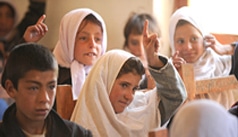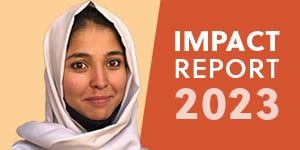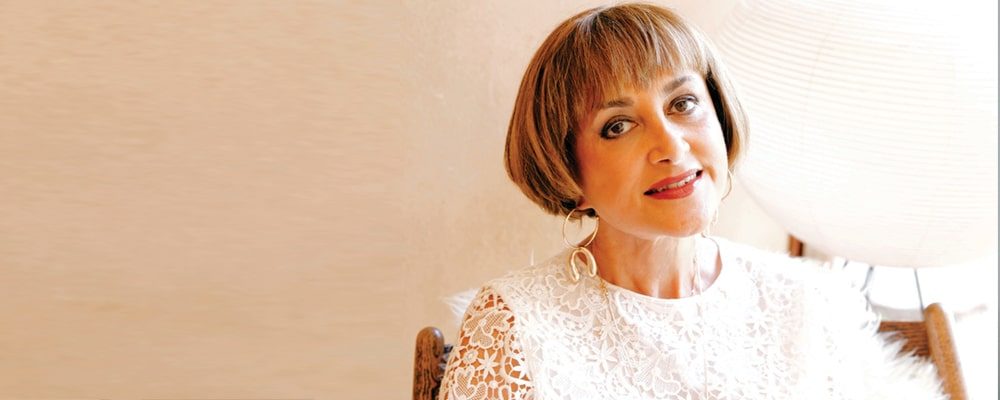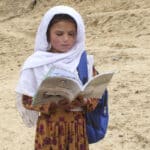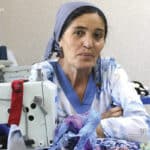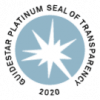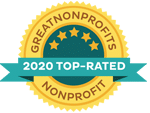PROFILE: Mina Sherzoy CAI Board Member
CAI Board member Mina Sherzoy has never been one to shy away from a challenge. From empowering Afghan women to pursuing a career in fashion design to raising two daughters as a single parent, she has no shortage of impressive accomplishments.
Growing up in Afghanistan during the late 1960s and 1970s, Mina’s family supported her as she pursued her education and her dreams. While she acknowledges it was a “male-dominated culture,” it was nothing like what it is today under strict Taliban rule. “My parents were always for education, development, and personal growth. They always encouraged me to study, to be the best,” she said.
During the Soviet invasion of Afghanistan in 1979, Mina was forced to flee at the age of 17. At the time, her father was an ambassador in Prague. “It’s funny because I used to travel through communist countries and would feel sorry for them because it was so hard to live there,” she said. “But I didn’t know that one day it would happen to us.” Her family reunited and fled together to the United States, eventually making their way to California. Soon after arriving, Mina got married, had two daughters, and navigated life in a new country. “I was young, scared, and had lost everything—all the dreams, hopes, identity. When you become a refugee, the first thing you lose is your identity—who you are.” Although she had always planned to go to university, the demands of family and work presented tremendous obstacles. “This is where I lost track of my education. I had to work, I had to raise two kids, and ended up in an unhappy marriage. But still, in the back of my mind, I told myself that one day I will go to university and get that bachelor’s degree, no matter what.” Eventually, she did.
Mina enrolled at the University of Phoenix, having to balance work, parenting, and her education all at once. “I struggled to get that degree!” The experiences she had during those years ended up being some of the most formative of her life, and she wanted to share what she learned with her fellow Afghans.
She finally got the opportunity to go back to Afghanistan after 9/11 and the U.S. invasion, when there was a wave of positive social change, especially for girls and women. Mina was determined to go back to her home country and be part of it. “When I went back to Afghanistan, I reconnected with people who had remained during war. I told them what I had gone through and I was encouraging their kids not to miss all the opportunities that the international community had brought in—the scholarships, the free education. Everybody wanted to get educated, but they needed to know where to go and what to do. All they needed was guidance. You train them, you equip them, and then let them fly like a bird. And this is how I came to work back in Afghanistan.”
I want to do this work for the next generations: The Americans who are in international development, not to be the way they were in Afghanistan. And for the next generation of Afghans, to learn not to believe everyone’s promises and to be self-sufficient and collaborative.
While in Afghanistan, Mina founded the Afghan Women Business Association and Afghan Women Business Federation. She also worked with USAID to launch Afghanistan’s first female private-sector business federation and participated as an observer in the Afghanistan Independent Election Commission.
In 2004, Mina met a young woman who had come to Kabul from the provinces and wanted to be a doctor. Mina was able to connect the woman with a scholarship to study medicine in Romania, but her family wouldn’t allow her to go. Curious as to their reasoning, Mina went to meet with the woman’s father and her brother, who was, himself, a medical doctor. She was shocked by what she heard. They believed that if the young woman traveled abroad, she would become a prostitute. Looking the brother in the eyes, Mina said, “You have studied, but you haven’t grown.”
Mina hired the young woman to work on her USAID project. As soon as she began earning an income, her status in the family changed completely. One day, the woman told Mina, “You know, they respect me at home. Now I don’t have to wash the dishes or care for my younger siblings. When I come home, my food is ready.”
Throughout her work in Afghanistan and the surrounding countries, Mina gained profound insights into the challenges of development in the region where she grew up.
“South Asian women face common challenges in a male-dominated society. They all face a lack of social support and lack of political support. There is violence, nepotism, and corruption. I kept thinking that half of the population in that South Asian belt is paralyzed. And then you sit here in the Western world and say, ‘Why is there insecurity? Why are there terrorists? Why is there drug dealing? Why is there human trafficking?’ When half of the population is paralyzed, what other outcomes do you expect?”
Mina sees her work as critical to changing things in both America and Afghanistan. Although the return of the Taliban in 2021 made Mina a refugee for the second time in her life, she continues her work with refugees by supporting resettlement agencies as Afghans navigate their new realities in the United States. “I want to do this work for the next generations: The Americans who are in international development, not to be the way they were in Afghanistan or any other developing country. And for the next generation of Afghans, it is imperative to grasp the lesson of not placing blind trust in every promise made and to be self-sufficient and collaborative.”
For Mina, serving on the Central Asia Institute Board helps to fulfill her desire to continue giving back and sharing her tremendous expertise and lived experiences. “Everyone is so passionate about this cause. What I like about Central Asia Institute, it’s not just about Afghanistan. It’s Pakistan, Tajikistan, too. CAI has come a long way. Everybody is doing this work from their hearts.”
Are you interested in getting more involved with Central Asia Institute?
Do you have experience serving on nonprofit boards or in international development, nonprofit management, or fundraising?
Drop us a note at info@centralasiainstitute.org.
We’d love to hear from you!
Mina is a Program Officer with the US Committee for Refugees and Immigrants. She founded Excel consulting and has held key leadership roles in international development projects, including USAID’s Director of Business Association Development for Trade Show Support Activities and Director for the $40 million USAID Promote Women in Government (WIG) program, the largest women’s empowerment project in the world.
